Scotland Housing Awards 2025
Read all the shortlisted entries into this award category, housing team of the year, at the Scotland Housing Awards (SHA) 2025 and find out who won the award on the night.
The title of housing team of the year will be awarded to a team who have delivered an outstanding contribution to their organisation and for the housing sector. The award is designed to recognise achievement of something special, as part of developing new services, dealing with difficult situations or delivering the best services.
This award was sponsored by Brodies.
Winner
Tenant Participation Team from North Lanarkshire Council
Statement of support
North Lanarkshire Council’s tenant participation team has delivered outstanding progress in embedding tenant involvement at the heart of housing service delivery. Through innovation, inclusion, and strategic collaboration, the team has achieved measurable outcomes, culminating in TPAS Scotland Gold Accreditation in 2024, recognising their excellence in tenant participation, communication, and co-production.
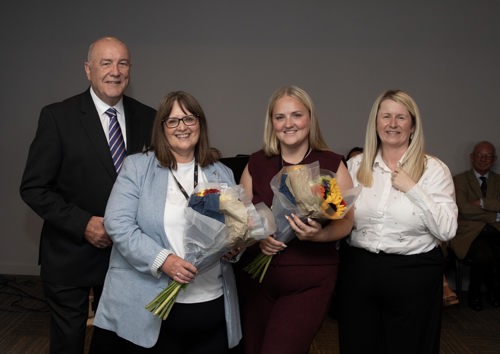
As Scotland’s largest local authority landlord, managing over 36,000 homes, North Lanarkshire’s team has risen to the scale and complexity of this challenge. Their work is underpinned by a commitment to inclusive engagement, transparency, and empowering tenant voices to shape and scrutinise housing services.
Together with tenants, the team has developed a robust set of standard engagement offerings across all housing localities, supported by senior management and reflected in the current Tenant Participation Strategy. Over the last year, engagement opportunities have been reviewed, with volunteers and staff adopting new and improved procedures, including updated terms of reference and codes of conduct for:
- Scrutiny panels
- Estate walkabouts
- Chair persons meetings (quarterly forums with locality managers and all tenant groups)
- North Lanarkshire Federation Executive Committee and its sub-committees for land & waste management, roads & streetlighting, and ambition for North Lanarkshire
The Tenant Participation Strategy was reviewed extensively in 2024 through a year-long programme of conferences, online focus groups, coffee mornings, and committee meetings. This culminated in the launch of a refreshed strategy for 2025–2030, making all commitments accessible to every tenant and group within the authority.
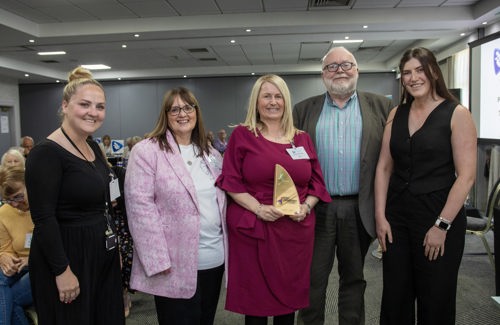
The TPAS Scotland Gold Accreditation, awarded in 2024, recognises:
- A strong culture of partnership working with tenants
- Clear evidence of tenant influence over policy and service decisions
- Innovative and accessible engagement methods, especially for harder-to-reach groups.
This prestigious accreditation reflects a deeply embedded culture of listening, learning, and acting, both within the team and across wider council departments.
The tenant participation team’s exceptional and sustained performance is evident in key Scottish Social Housing Charter indicators, where North Lanarkshire significantly outperforms the local authority average. In 2023:
- 86.6 per cent of tenants were satisfied with the overall service provided, a 5.4 per cent increase since 2021 and well above the
- 83.2 per cent local authority average
- 95.8 per cent of tenants were satisfied that the landlord keeps them informed about services and outcomes, rising 3.2 per cent and substantially exceeding the local average of 81.1 per cent
- Most notably, 96.8 per cent of tenants were satisfied with opportunities to participate in landlord decision-making, maintaining a remarkable level since 2019 and vastly surpassing the local authority average of 76.5 per cent.
It is important to note that the tenant participation team was established in 2018 following a 15 year period when tenant involvement was subcontracted externally. These figures demonstrate the team’s relentless commitment to meaningful tenant involvement and transparent communication, establishing them as a national leader in tenant participation.
What makes this team exceptional is their values-driven, tenant-first ethos. Feedback from participants consistently highlights their approachability, consistency, and positive impact:
- Peter Fanning, chair person, Kirkwood TARA “My personal thanks for your support in setting up the Kirkwood 2023 Tenants’ and Residents’ Association. Your support is much appreciated.”
- Jim Leonard, chair person, NLF: “This is a great testament to the hard work and dedication of the group and council officers.”
In conclusion, North Lanarkshire Council’s tenant participation team exemplifies how meaningful tenant involvement drives tangible service improvements, builds trust, and transforms communities. Their innovation, performance, and nationally recognised excellence make them an outstanding candidate for Team of the Year.
Outcomes and achievements
- Servicing 40 plus tenants & residents groups every month
- Expanding the team to cope with demand - new recruits August 2025
- TPAS Scotland Gold Accreditation 2024
- Flagship NL in Bloom Garden Awards - recognising commitment and achievement of local people, applications increasing on average 30 per cent year on year
- Strong partnership with NLF to deliver calendar of engagement activities
- Food for Thought Training and Education Programme delivered annually
- Robust scrutiny programme, in partnership with independent tenant advisors North Star Consulting & Research recent topics include complaints, reporting repairs, allocations and tech in retirement housing
- Stepping up to Scrutiny training for all volunteers
- Dedicated office space funded by NLC for North Lanarkshire Federation to host their own meetings and events - they can offer this to community groups and forums to promote local initiatives
- TP grant funding programme for new and existing groups
- Supporting groups to raise/access other grant funding, with group alone being supported to raise over £200,000
- Team providing training and support to other departments to promote tenant participation and engagement and ensure commitment across the authority
- Flagship annual tenants conference with consistently high attendance and 90 per cent of attendees declaring it excellent/very good
- Local Hero Awards established in 2023 to recognise tenant achievement.
Shortlisted entries
Housing team - Knowes Housing Association Ltd
Application entry
- Team nominated: Housing team - Kara Halpin, Karen Grainger, Lisa Marie Brown, Nicola Gerrard, Fiona Campbell
- Organisation: Knowes Housing Association Ltd
Statement of support
Knowes Housing Association Ltd is a small community based registered social housing provider and a charity. Over the past five years, the housing team at Knowes Housing has undergone significant change, with the departure of long-serving colleagues through retirement and bereavement. Despite these challenges, the newly established team has united with enthusiasm, commitment, and a shared focus on delivering excellent housing services to the Faifley community.
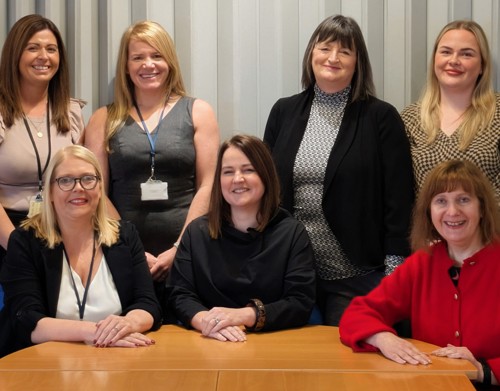
This new team has brought energy and dedication to the organisation’s goals, resulting in substantial improvements across all key service areas, including arrears management, anti-social behaviour (ASB), allocations and letting times, estate management, and tenancy sustainment. Their collaboration and mutual support have been central to delivering a consistently high level of service to our residents in Faifley.
Operating within one of the most deprived areas on the Scottish Index of Multiple Deprivation, the team is acutely aware of the challenges faced by many of their tenants. As such, they provide a compassionate and comprehensive support system that ensures tenancies are sustained, and tenants are given every opportunity to thrive.
Tenancy sustainment and wraparound support
Tenancy sustainment is embedded in every part of the team’s work. When tenants struggle with rent, the team acts swiftly, offering tailored support. This includes:
- Signposting to our partner agency, Citizens Advice money and debt advice service
- Working in partnership with other local housing providers and sharing a dedicated community support officer, who identifies and addresses wider issues
- Access to practical assistance via our Tenancy Sustainment Fund, supporting tenants with food provision, mental health referrals, and essential household items such as white goods and furniture.
This wraparound approach ensures tenants are supported holistically, helping reduce arrears and prevent tenancies from failing.
Allocations and voids management
Over the past two years, the allocations team has successfully transitioned to an online application process, doubling the number of applications received. The team is committed to ensuring quick turnaround of void properties, allowing those on the waiting list faster access to quality housing.
All properties are let to a high standard and are in walk-in condition, relieving the financial burden on new tenants. Where needed, a generous decoration allowance is provided. Referrals to the community support officer further support new tenants with starter packs and links to affordable furniture suppliers.
Proactive estate management
The team takes great pride in delivering a responsive and proactive estate management service. Monthly inspections ensure repairs and grounds maintenance are carried out promptly. A comprehensive common cleaning contract covers closes, back courts, bin areas, and front paths. A dedicated bulk uplift service has drastically reduced fly tipping and improved the cleanliness of the area.
As a result, estate management complaints have significantly declined, while tenant satisfaction with the condition of their neighbourhood has risen notably.
Reducing anti-social behaviour
The housing team has made strong progress in tackling ASB. Over the past year, ASB complaints have dropped by 25 per cent. This improvement is thanks to early intervention, strong partnership working, and a commitment to supporting both victims and perpetrators towards resolution and behavioural change.
Conclusion
The Knowes housing team has not only navigated a period of great internal change but has emerged stronger and more effective than ever. Their commitment to tenants, especially in an area of high deprivation, is evident in their exceptional performance, innovative practices, and compassionate service delivery.
Their work in tenancy sustainment, allocations, estate management, and ASB has resulted in demonstrable improvements and outstanding service outcomes. This team embodies the values of housing management—resilient, tenant-focused, and results-driven—and is fully deserving of recognition through this award.
Outcomes and achievements
Achievements summary: 2024-25
Arrears management
- Arrears reduction: Arrears have decreased significantly over the past two years.
- 2024-25: £61,986.76 (1.42 per cent of rental income)
- 2021-22: £129,581.97 (2.97 per cent)
- Evictions: Zero evictions due to arrears in 2024-25, highlighting effective arrears management and support strategies.
Allocations
- Housing applications:
- 2024-25: 760 live applications
- 2020-21: 305 applications
- Stock turnover:
- Fell from 110 properties/year (10 per cent) to 58 properties/year (5.65 per cent)
- Void turnaround time in 2024-25:
- Average of 5.9 calendar days per property
- Compared to Scottish national average: 53 days
Sustainment work
A total of 233 interventions delivered in 2024-25, supporting tenants across various areas:
- Fuel poverty: 23
- Digital assistance: 3
- Food poverty: Four
- Partnerships: 78
- Staff referrals (CHA): 120
- TSO budget assistance: Five
Anti-social behaviour (ASB)
- Complaints decreased by 25 per cent year-on-year:
- 2023-24: 120 complaints
- 2024-25: 91 complaints
Collaborative Excellence in Rehousing – Enabling the Regeneration of Manse Gardens, Strachur - Trust Housing Association
Application entry
- Team nominated: Collaborative Excellence in Rehousing – Enabling the Regeneration of Manse Gardens, Strachur
- Organisation: Trust Housing Association
Statement of support
Collaborative Excellence in Rehousing – Enabling the Regeneration of Manse Gardens, Strachur
This submission recognises the outstanding collaborative efforts of the customer experience and assets teams at Trust Housing Association, whose work to sensitively and successfully rehouse seven customers at their Manse Gardens development in Strachur was instrumental to unlocking the site for redevelopment.
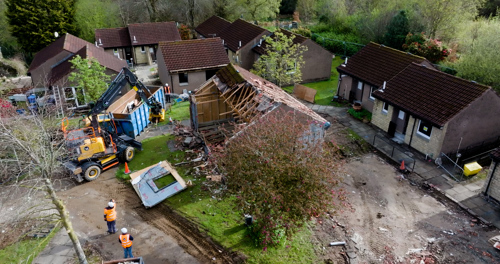
Originally built in the early 1980’s and comprising 21 small, purpose-built sheltered housing homes, Manse Gardens was no longer fit-for-purpose following the withdrawal of revenue funding in 2017. Most recently let as Amenity housing, Trust ceased re-letting homes in 2019 in order to design its sustainable future and, by 2022, only seven customers remained.
The bold plans will transform the site, delivering a reduction in overall homes to 16, enhancing the space standards, providing new open space and creating a new sustainable housing mix, one which meets local housing needs. Removing all of the previous unpopular studio properties, the plans will improve the accessibility and energy efficiency of customers homes.
The regeneration of Manse Gardens is being delivered in partnership with Argyll & Bute Council and the Scottish government, both of whom are providing significant capital grant funding contributions, however, these plans could not have proceeded without first re-housing the remaining customers for the period of the construction works.
Strachur is a remote rural community located some 16-miles north of Dunoon. The challenge was significant, with no local housing association stock available to assist with customer decants, and private rental options extremely limited or unsuitable. Despite this, Trust’s project team worked tirelessly to find solutions that prioritised customer wellbeing and dignity.
The team’s approach was rooted in collaboration, creativity, and compassion – often thinking well beyond traditional routes. Each customer was engaged in one-to-one consultation to understand their individual needs, preferences, and concerns.
One customer quickly identified a housing solution themselves, but with local options scarce, a solution for five customers was found via a holiday park, in nearby Dunoon. Accompanied visits were arranged by the team, which extended to family, friends, Occupational Health and care support workers. Individual preferences were met in almost every instance and following acceptance by five customers, a commercial lease was concluded for the period of the works.
The park was not suitable for all, and a particularly complex case arose with an elderly customer. The customer relies on a mobility strider, multiple care support visits, daily, and required a property with full level-access living. The holiday park options were evidently unsuitable, and the project team had to think outside of the box for an answer. They were able to identify a rarely available property on the open market, located close to Manse Gardens itself.
The three-bedroom family home identified had the ground floor accommodation required and was quickly assessed and approved as suitable. Thereafter followed coordinated discussions with both the council and Scottish government, who provided additional acquisition grant funding. A price was negotiated with the seller and the transaction settled within seven weeks of the first viewing. Essential major works followed, including the installation of a new kitchen and energy-efficiency improvements including an air source heat pump, solar PV and battery storage, in order to facilitate a move-in date for the customer only four-weeks later. These collective efforts will provide a safe and warm home during the period of the works, whilst in the long-term providing a much needed additional family-home to the social rented sector in Strachur.
The collaborative approach was mirrored across all rehousing cases. The team held regular coordination meetings, shared real-time updates, and maintained a flexible, problem-solving mindset. Every decision was underpinned by a commitment to customer wellbeing, with practical and emotional support provided throughout the transition.
Outcomes and achievements
The project teams work resulted in a successful rehousing process that not only enabled the regeneration works at Manse Gardens to begin on schedule in March 2025, but also delivered improved living conditions, both in the short and long-term for all seven customers. Feedback from those rehoused has been overwhelmingly positive, with many expressing gratitude for the care, respect, and professionalism shown by the team.
Now under construction through Argyll-based TSL Contractors Ltd, we will be able to welcome our seven customers, and nine new neighbours, back to Manse Gardens in Spring 2026 and into sixteen much-needed and improved homes for social rent. All homes will benefit from enhanced space standards, new kitchens and bathrooms, and a full suite of energy efficiency upgrades, including new windows, doors, roofs and new heating systems, solar panels systems & battery storage.
The success of this project to date is a testament to the power of internal collaboration. By working cross-functionally, thinking creatively, and placing customers at the heart of every decision, our team not only enabled this vital regeneration project to proceed - they delivered meaningful, immediate improvements to our customers lives and long-term housing options benefits to the community of Strachur.
Carol Reid on behalf of the Housing Team (Income Recovery Manager and Officers | Neighbourhood Manager and Officers | Voids & Allocations Manager and Officers) - Grampian Housing Association
Application entry
- Team nominated: Carol Reid on behalf of the Housing Team (Income Recovery Manager and Officers | Neighbourhood Manager and Officers | Voids & Allocations Manager and Officers)
- Organisation: Grampian Housing Association
Statement of support
In line with our strategic objective to provide local, customer focussed services, in November 2024 Grampian Housing Association (GHA) undertook a significant restructure of its housing team (the team). This followed a successful pilot during late 2023 to 2024 and was in line with GHA’s commitment to continuously improve customer service delivery and enhance key performance indicators (KPIs).
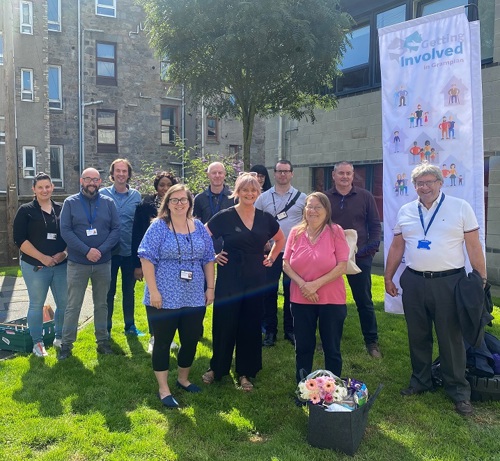
The restructure was informed by GHA’s new customer excellence initiative, The Grampian Deal, which was co-created with tenants to ensure service delivery is focussed on the priorities and needs they identified.
Driven by the desire to better meet the evolving needs of GHA’s tenants, the restructure also provided an opportunity to address issues such as anti-social behaviour (ASB) and domestic abuse as well as to improve efficiency within the service. As a result, the team was reorganised into three distinct and specialised areas: neighbourhood, voids & allocations, and income recovery allowing each team to focus on a core aspect of housing management.
Positive results can already be evidenced.
The voids & allocations team takes a holistic view of the voids process to ensure the integration of both the repair and allocation of empty houses. This has contributed to a marked improvement in re-let times, ensuring that empty properties are brought up to standard, turned around more quickly and made available to new tenants without unnecessary delays. Tenant satisfaction is evidenced by a decrease in refusals following a formal offer.
Similarly, the income recovery team has seen a reduction in arrears, demonstrating a more targeted and effective approach to rent collection. Support is also offered to tenants in financial difficulty during these challenging economic times and they can be signposted to GHA’s SMART money advice and debt counselling project.
One of the most strategic changes made during this restructure was the secondment of a neighbourhood officer to a dedicated anti-social behaviour (ASB) officer role for a 12-month period. This position was created in response to a noticeable increase in ASB reports and the growing need for a proactive, structured approach to managing such incidents. The ASB officer has been tasked with developing a comprehensive ASB toolkit to support staff in effectively dealing with these complex and often sensitive cases.
In addition to the ASB remit, the officer has also taken the lead on domestic abuse issues. Recognising the importance of early intervention and support, a domestic abuse toolkit has been created and rolled out to staff, equipping them with the knowledge, guidance, and confidence to respond appropriately to cases of domestic abuse. This initiative has already strengthened our response and enabled us to offer a more informed and compassionate service to vulnerable tenants.
The impact of clearly defined, specialised roles has been particularly beneficial for colleagues. They are now able to dedicate their efforts to one specific area of housing, allowing them to develop deeper expertise and provide a higher quality of service. This is coupled with GHA’s commitment to learning and development. All housing colleagues undertake CIH qualifications which foster professional credibility and greater understanding, ensuring they find their careers in housing rewarding.
Tenants benefit from this clarity and consistency, as they know who to contact for specific issues and receive more focused support.
Collaboration remains integral to service delivery. Neighbourhood officers have been working closely with area technical officers, carrying out joint visits to schemes to increase tenant engagement and address issues more holistically.
Whilst roles have become more specialised, colleagues are still encouraged to maintain a broad skill set and support colleagues across different teams, collaborating with other public and voluntary organisations when required. This flexible approach ensures continuity of service and fosters a strong sense of teamwork.
Outcomes and achievements
Improved KPIs and increased tenant satisfaction reinforces why GHA is nominating colleagues for housing team of the year
Reduced re-let times
- March 2023 – 39.31 days
- March 2024 – 27.6 days
- March 2025 – 22.56 days.
Decrease in refusals following a formal offer (demonstrating satisfaction with properties)
- March 2023 – 11.75 per cent
- March 2024 - 11.97 per cent
- March 2025 – 9.72 per cent.
Gross arrears
- March 2024 - 4.78 per cent
- March 2025 - 4.18 per cent.
Domestic Abuse Working Group established and Domestic Abuse, Stalking and Harassment (DASH) training provided to colleagues on the group as well as frontline staff.
ASB and Domestic Abuse toolkits launched for staff.
Tenant feedback also demonstrates the positive impact of the changes across the teams:
- Income recovery: "I can't thank my housing lady for the help she gave me with my housing benefit and my gas and electric. She is one in a million she got everything sorted within a couple of weeks. I'm really grateful for all she did for me and she is a nice person and she listens to what you’re saying and she has the patience of a saint.”
- Neighbourhood: “I can’t thank you enough from the bottom of my heart, you have changed my life for the better”, “Thank you so very much, it’s just magical, you are simply the best”, “Thanks so much for all your help, you’ve been great to both of us and we appreciate it very much.”
- Voids and allocations: “Thanks again to everyone at Grampian for giving us the opportunity to live in such a lovely home and area.”
In conclusion, the housing restructure has already led to significant improvements in both service delivery and performance metrics. By focusing on specialisation while retaining flexibility, we are better positioned to meet the needs of our tenants and deliver a first-class housing service.
Wheatley Homes South
Application entry
- Team nominated: Wheatley Homes South
- Organisation: Wheatley Homes South
Statement of support
Bringing together a dedicated compassionate team, Wheatley Homes South (WHS) stands out as an award-winning, cross-departmental group, which is delivering sector-leading performance.
With almost 10,400 homes, WHS is the largest social landlord in Dumfries and Galloway and the second largest in Scotland. It covers around 6,000 square kilometres with communities, such as Lochside in Dumfries and Dicks Hill in Stranraer, which experience particularly high levels of deprivation and challenges of rurality.
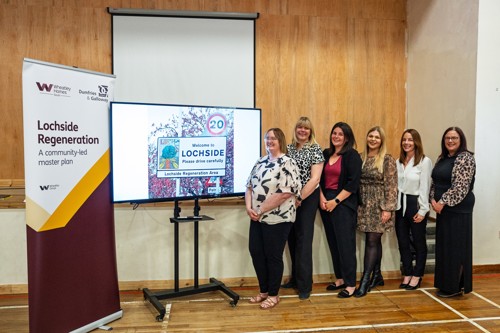
WHS employs over 230 staff across departments, including housing, repairs, environmental, development, investment, and the Customer First Centre. WHS cover this footprint with offices in Dumfries, Lockerbie, Sanquhar, Annan and Stranraer.
Undeterred by geographical footprint, WHS was this year determined to improve overall customer satisfaction and ensure all parts of the business collaborated on customer priorities to deliver solution-focused outcomes.
From trades, housing officers, investment co-ordinators, and the communication team, this group of staff really know how to get the job done.
In 2024/25, WHS achieved an outstanding 95 per cent customer satisfaction – an eight per cent increase from the previous year.
In the crusade to deliver outstanding services and ensure customers remained central to decision making, engagement work and cross-team collaboration led by Stronger Voices officers and housing officers resulted in 328 customers signing up to our customer engagement programme.
This programme encourages customers to get involved in panel discussions on topics including rent, repairs, anti-social behaviour and the local environment. This allows them to help shape our services.
Improving outcomes for customers and communities, WHS supported 30 customers to train as Keep Scotland Beautiful assessors – the national environmental charity helping create greener environments.
Working with staff, customers are empowered to make improvements within their communities.
WHS repairs service has also been integral to improved customer satisfaction. The drive to enhance repair performance is attributed to the creation of a positive culture where our commitment to excellent service was embedded across all teams.
Through training and conversations, we built confidence across our teams, fostering strong relationships with colleagues across housing and neighbourhood teams. This approach enhanced familiarity between teams, creating a drive toward excellence. These relationships allowed us to respond to challenges swiftly and ensure services were integrated across the interdependencies.
We improved material management by working closely with our provider, building a partnership that prioritises the needs of our teams, and our customers. This ensured that operatives always had the right resources required to carry out their work effectively, reducing delays and supporting a first-time fix culture.
Development and regeneration are also a part of the WHS mission. In the last year, we supported families to move into 89 new-build homes at Curries Yard in Heathhall and 47 new homes at Ewart Place in Springholm.
- Alison Ostroznik, 57, and her granddaughter Courtney, 22, moved into Curries Yard. Alison said: “I love it here. It’s a really lovely house. My granddaughter and I are both really happy here. We’re very grateful to have such a nice home.”
- Robert Anderson, 61, was one of the first customers to move into the development in Springholm, following being in temporary homeless accommodation. He said: “It’s a lovely house in a lovely area. All my family are delighted and keen to see me settled and hopefully get back into work at some stage. I hope this is our forever home now.”
The most significant aspect of this team approach is that WHS are part of the communities they serve. They live and work alongside customers, which creates a personal commitment to going above and beyond in every interaction. This local presence means that feedback is immediate and the drive to improve is genuine and ongoing.
Outcomes and achievements
The team is exceptionally proud of the achievements and satisfaction results as below.
Scottish Housing Regulator Indicators - 2024/25
Overall satisfaction
- 95 per cent - WHS Result
- 86 per cent - SHN Member Average
Being kept informed/making decisions
- 98 per cent - WHS Result
- 90 per cent - SHN Member Average
Opportunities to participate
- 100 per cent - WHS Result
- 87 per cent - SHN Member Average
Repairs service
- 97 per cent - WHS Result
- 87 per cent - SHN Member Average
Quality of home
- 93 per cent - WHS Result
- 84 per cent - SHN Member Average
Management of neighbourhood
- 94 per cent - WHS Result
- 85 per cent - SHN Member Average
Value for money
- 97 per cent - WHS Result
- 81 per cent - SHN Member Average
In addition to 95 per cent customer satisfaction, above the Scottish average (86 per cent), other notable results include gross rent arrears of 3.97 per cent against the Scottish average (6.70 per cent).
The team has sector-leading results, especially in repairing and re-letting empty homes at an average of 8.31 days compared to the Scottish average of 56 days.
What makes WHS stand out?
By going above and beyond, working together, regardless of the challenge. Whether that’s a housing emergency, helping customers out of debt, or delivering the best performance results across the sector, the team rises to the challenge. That’s despite facing the challenge of rural service provision and extreme weather over the past year.
Customers and partners recognise WHS as transforming the region and delivering outstanding services. For the size and scale of the organisation and region, this is a sector-leading achievement, not only in Scotland but the UK.
Highland Housing Management Team - Highland Council
Application entry
- Team nominated: Highland Housing Management Team
- Organisation: Highland Council
Statement of support
During and following the Covid-19 pandemic, rent arrears steadily rose nationally as tenants struggled with the cost of living crisis and the energy crisis. This also happened in Highland, with rent arrears reaching historically high levels.
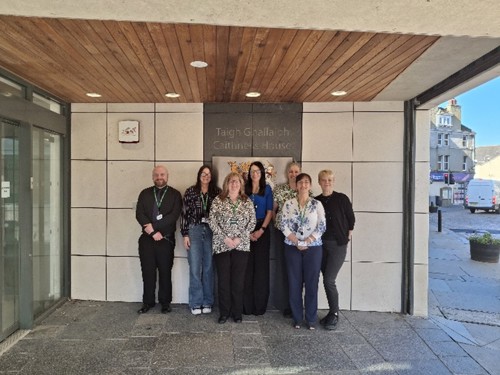
Officers admitted to struggling with non-engagement with tenants. Tenants themselves voiced concerns about confusing messages at a government level around the emergency legislation and the support available to them.
Following a lengthy period of review and discussion, in 2024/25 Highland initiated a number of changes to ensure that we were managing rent arrears more proactively and within a clear performance framework:
1. Restructure
Housing management teams were restructured in Inverness and Ross-shire to follow a neighbourhood teams model. This was aimed at providing:
Clear geographical remits for officers involved in rent management
A more balanced workload for these officers
An improved focus on home visits and accessibility
Improved links between officers dealing in rent management and specialist officers involved in tenancy sustainment, housing support and allocations.
2. Performance structure
This structure also dovetailed with the Housing Talent Strategy, a new initiative to improve the level of training and professionalism in the housing management team and which is subject to another award nomination. A Rent Management Improvement Group was established, with a clear focus on reviewing high level arrears, static arrears and on providing officers with better and more proactive rent arrears management reports.
3. Support for tenants
Our team reviewed arrangements around the advice and assistance to our tenants. This build on existing protocols with the corporate welfare support team but also an increased drive to promote their services and refer tenants to them.
There was also a review of the referral mechanism to housing support providers, to ensure quicker processes between frontline officers identifying tenancy management issues and the delivery of contracted and specialist services. To promote delivery of tenancy sustainment, three housing management assistants were appointed to deliver additional services all focused on ensuring tenants received maximum support as quickly and efficiently as possible.
As part of the revised approach, there was also a strengthening of partnership work with energy advice agencies such as Ali Energy and also the CAB, the focus being on proactive referrals rather on bureaucratic processes.
The extensive geographical coverage of our housing stock necessitated a collaborative approach across all teams, to ensure that tenants received the necessary support, regardless of their location. To achieve this level of support, the front-line customer service and welfare and benefits teams had to go above and beyond their call of duty to identify and subsequently assist households in need.
The feedback from our tenants has been positive and emphasises the relational nature of the landlord/tenant culture where we assist with tenancy sustainment. Our service restructure and our focus on support and assistance to tenants, has meant that our officers are the first point of contact for tenants in financial need of assistance. This has improved relations with tenants and has also significantly increased rental income, essential to meet the tenant rent consultation priorities around estate and repair investment.
Outcomes and achievements
Arrears are now at their lowest level since April 2022. This is despite the annual rent increases of four per cent, 7.95 per cent and eight per cent in recent years
Arrears are at £2.907 million as at 30 June 2025. This represents a £0.618 million improvement since April 2024
The table below gives specific information as to the number of tenants in arrears and the value of these arrears
| Arrears Band | Tenants in arrears (June 2025) | Amount owed (June 2025) | Tenants in arrears (June 2024) | Amount owed (June 2024) |
| Band A <£500 | 3,904 | £720,816 | 3,526 | £629,449 |
| Band B £500 - £1,000 | 808 | £559,496 | 770 | £543,610 |
| Band C £1,000 - £2,500 | 558 | £872,393 | 720 | £1,113,535 |
| Band D over £2,500 | 205 | £754,600 | 267 | £1,058,384 |
| Total | 5,475 | £2,907,305 | 5,283 | £3,344,978 |
- Welfare benefits support from the council’s in-house team included 331 tenants supported by the welfare support team and a further 521 tenants supported by intensive support officers
- CAB supported 254 tenants with estimated total arrears of £0.569 million
- AliEnergy supported 633 tenants with an average gain of approximately £500 per tenant (access to redress funds, fuel poverty support and energy advice).
Void team - River Clyde Homes
Application entry
- Team nominated: Void team
- Organisation: River Clyde Homes
Statement of support
One of the key strategic outcomes of the River Clyde Homes (RCH) business plan is “Excellent services”, and RCH is dedicated to improving services and providing excellent value to both current and future customers.

In 2024, it was identified that improvements were needed in the void management processes due to several factors, including the impact of the COVID pandemic, increasing costs, lead-in time for materials, and challenges in attracting and retaining resources.
An independent consultant was commissioned to undertake a comprehensive review of the void management process. The review involved staff across part of the RCH Group who were in the void management process, staff involved in the letting process and customers who provided feedback on their journey from being offered a property to moving in.
The review resulted in an action plan being created covering the following categories and the RCH void team had the vital role in implementing the key actions.
People
A demand analysis revealed that the RCH void team was under-resourced. To address this, two experienced members of staff were seconded to the team: a trade operative from Home Fix Scotland (HFS) RCH’s in-house subsidiary with void property experience, and a housing team member with both technical and housing expertise. This approach utilised existing staff skills and experience, enabling internal development without external recruitment and subsequent cost to the business.
Processes
It was found that the current housing software system that allows for measuring all stages of the void management process, identifying blockages, and finding solutions was not being used to best effect. A mapping exercise on the void process was conducted with staff from across the RCH Group, and an innovative approach to using the same housing software system to monitor voids and report on key stages was implemented in April 2024. The approach was reviewed further and refined based on staff feedback at the end of last year.
Prior to the review, Home Fix Scotland, undertook void repairs however, given the intricate nature of the void repairs, the organisation decided to bring in an additional contractor. This led to an improvement in time taken to complete works and an increase in the number of properties ready to let. This approach also delivered value for money for the business and customers.
Systems
The void team previously scoped void properties using paper, which was time-consuming and inefficient. To improve productivity, the void team collaborated with the IT Team to explore a technology solution that was compatible with the existing housing software system. For the first time ever, the void team began using tablets to scope void properties, resulting in improved productivity and efficiency.
Assets
A review of the void lettable standard was conducted, incorporating staff feedback provided during the review. This led to changes in the works carried out at the void stage, such as increasing the number of properties fully decorated instead of just one or two bedrooms. This enhanced offer is more cost-effective and appealing to customers and assisted in letting properties where there is a lot of local competition.
Culture
A shift towards continuous improvement and partnership working has significantly improved void and letting performance. Initiatives include weekly meetings with contractors, daily updates to housing teams, visual measure boards displaying performance on void returns and lets, and monthly and quarterly performance reviews and feedback sessions with staff and customers.
Outcomes and achievements
A combination of several key factors has led to a more effective void management process and better customer services. The RCH void team made this happen due to their relentless determination and ‘never give up’ attitude, and their commitment to ensuring all priorities in the void action plan were fully implemented.
Performance improvements in last 12 months:
- Customer numbers increased by over 200, to the highest number of RCH lets ever
- Net rental income increased by circa £700k
- Days to let reduced by almost 60 per cent
- Refusal rate reduced by 13 per cent
- Length of time to scope void properties – reduced by 50 per cent.
Customer feedback via CX Feedback - almost 90 per cent of customers were satisfised with the condition and quality of their new home.
- “Very happy with my house and greatly appreciated the help I have had from River Clyde Homes and from the staff thanks so much”
- “Letting process was first class, thank you”
Enhancing services for customers, increasing the customer base, and ensuring value for money are key strategic priorities for RCH and the void team played a significant part in making this happen, resulting in every customer happy and every home loved.
Out of Hours Housing Team - North Lanarkshire Council
Application entry
- Team nominated: Out of Hours Housing Team
- Organisation: North Lanarkshire Council
Statement of support
The implementation of Rapid Rehousing Transition Plans, and a reduction in volunteers for the standby service, resulted in a review of resources to meet the needs of our homeless services in North Lanarkshire.
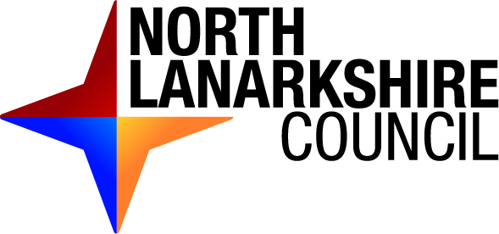
In 2021 – 2022 56 per cent of all calls were received between 4.45am – 10.00pm, resulting in 428 calls requiring a standby officer to physically respond to a roofless enquiry during these hours. Analysis showed that calls/call-out levels were lowest between 3am and 8.45am. The homeless standby service was staffed by housing officers on a voluntary rota basis. There was a group of five assistant accommodation officers who worked within the homeless temporary accommodation units.
It was clear that resources had to be targeted to deal with demand between 4.45 and 10pm, therefore it was agreed to redesignate the assistant accommodation officer to an out of hours housing officer role, and create a further three posts created to provide two teams of four housing officers who would work on a four-on-four-off work pattern, 365 days a year between 1pm – 11.30pm. From 1pm to 4.45pm they would be based in housing offices dealing with daytime homelessness.
The measure of success was a reduction in callouts for roofless calls, improved waiting times for customers, an improved level of service for individuals experiencing homelessness out with office hours, at a time when they are at their most vulnerable, as well as ensuring the housing service continues to meet its statutory responsibilities.
The out of hours housing team plays a vital providing essential emergency housing services, crisis support, and rapid problem resolution when others are unavailable.
The team were initially established February 2023, over the past two years, the team has demonstrated exceptional resilience, professionalism, and compassion, often acting as the first point of contact during incidents such as homelessness presentations, domestic abuse situations, anti-social behaviour, and welfare concerns. Their ability to respond quickly and sensitively has been a lifeline to hundreds of individuals and families across our authority.
- Rapid emergency response: Whether arranging emergency accommodation or coordinating with social work, health services or Police during critical incidents, the team acts swiftly, ensuring no one is left without support.
- Holistic, person-centred support: The team takes time to understand each case, offering trauma-informed, empathetic assistance. Their efforts often de-escalate crises before they worsen.
- Cross-team collaboration: The out of hours team provides detailed handovers and case updates to day services, ensuring continuity of care and positive long-term outcomes.
- Dedication beyond duty: Despite working unsociable hours, the team consistently shows up with professionalism and a deep commitment to community safety and customer wellbeing.
The services that the team provide have expanded outwith statutory homeless duties. They provide an extended service for the locality housing offices, which has enabled for customers unable to attend during normal working hours to speak to housing staff to get advice/assistance, complete a variety of applications, complete housing option interviews and assessments to ensure they are pointed correctly, attend viewings and sign up for tenancies which ensures customers are not financially impacted if required to take time off from work and lose income.
They carry out property checks for ongoing abandonment investigations which supports tenants who work and are unable to take time off paid employment to give access to conclude enquiries.
These are only a few examples of work completed outwith the initial reasons for setting up of the team.
We proudly nominate the out of hours housing team for CIH Scotland’s Housing Team of the Year, in recognition of their extraordinary dedication, teamwork, and transformative impact on people's lives when they need it most.
Outcomes and achievements
Within the financial year 2024 – 2025 the out of hours housing team dealt with 3,694 calls, which has been an 85 per cent increase in the volume of work initially anticipated when the review of services was carried out. The team have achieved the following outcomes:
- Meeting the local authorities statutory homeless duties, completing homeless presentation applications, arranging temporary accommodation and completing support assessment and benefit checks
- Referrals/signposting to external agencies including legal advice, financial/debt advise, support, health services and out of hours addiction services including “Turning Point” for immediate assessment and support
- Completion of domestic abuse risk assessments to link in with appropriate services and review for referral to MARAC nominations
- Community safety prevention and resolution for individuals involved in the MAPPA process
- Civil emergency support due to fires, floods, gas explosion, terrorist threats
- Supporting opening/managing emergency rest centres
- Assisting with transport, family mediation, delivering emergency food parcels, dealing with emergency power enquiries, liaising with police
- Review and manage the turnover of temporary accommodation resources.
Tenancy Sustainment Team - Albyn Housing Society
Application entry
- Team nominated: Tenancy Sustainment Team
- Organisation: Albyn Housing Society
Statement of support
In response to a significant reduction in support services across the Highlands, Albyn Housing Society undertook a strategic redesign of its housing support model in 2023. This led to the formation of the tenancy sustainment team, a specialist-led service designed to deliver focused, tenant-centred support across one of Scotland’s most geographically and socially challenging regions.
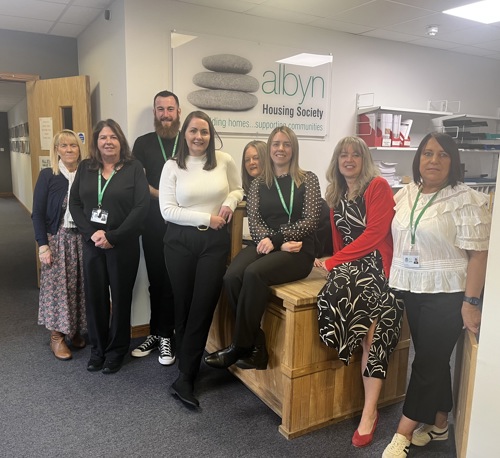
The team was created to address growing gaps in local service provision, particularly in remote communities where access to health, financial, and wellbeing support is limited or non-existent. Their mission is to empower tenants to build resilience, sustain their tenancies, and flourish within their communities.
1. Proactive support model
- Successfully delivered comprehensive support to over 1,200 tenants including welfare rights, financial capability, energy advice, and health and wellbeing referrals.
- Introduced the New Tenant Care Program, offering early engagement and tailored support from the outset of any tenancy.
- Implemented an Early Intervention Program to include pre-sign-up income maximisation and grant sourcing all to enable a positive new tenant journey that enables longevity of their tenancy.
2. Winter Welfare and Living Conditions projects
- Launched a Winter Welfare Call Program providing phone calls and home visits to over 350 vulnerable tenants, addressing isolation and health risks especially during periods of severe weather experienced in the Highlands.
- Successfully delivered a Living Conditions project to improve home environments and wellbeing, resulting in the creation of the Safer Homes project with dedicated internal funding. This specifically targeted hoarding tenants who were struggling to cope and enjoy their homes.
3. Energy and financial resilience
- Developed an internal Tenant Energy Fund to support tenants excluded from other schemes over 1,350 tenants benefited from some form of financial support
- Delivered the Affordable Warmth Service and as the funding ended successfully expanded it into the Energy Confident New Tenant Service
- Administered Albyn’s Tenant Support Fund totalling over £150,000, offering flexible financial aid for food, clothing, and essential items
- With significant help from property services team re-procured contractors’ terms and conditions to bring in an annual yield of one per cent of contract values that will used to directly support tenants. Year one will deliver £43,000 of additional financial help.
4. Digital inclusion
- Partnered with Red Chair Highland to deliver seven digital workshops in local and remote rural communities, supporting tenants who are digitally excluded.
Tenant testimonial from the Living Conditions project: “Without your help, I don’t think I would be here. I made an appointment with my GP, and he is helping me. He has referred me to a specialist in the hope of getting me a proper diagnosis and they will know what I need. My health is not great but at least I am getting help. I’m still taking my rubbish out every day and keeping the house tidy. I am hoping to visit my family soon, I haven’t seen them since Covid. Thank you for your patience and understanding, it’s good to know that someone cares.”
Partner testimonial: “Red Chair Highland has been collaborating with Albyn Housing Association for the past year and a half, developing and implementing digital inclusion initiatives for Albyn tenants.
These initiatives have positively impacted tenants by enhancing their digital capabilities, reducing inequality, improving access to consumer opportunities, and fostering better mental health and wellbeing. We have also observed a decrease in self-reported feelings of social isolation and an improvement in independence and self-efficacy. Red Chair Highland is pleased to be working with Albyn to help bridge the digital divide and promote digital inclusion among their tenants.” – Kirsty Adam, operations manager
Outcomes and achievements
- Tenancy sustainment improved from 93.38 per cent to 97.25 per cent, with previously homeless tenants rising from 89.25 per cent to 95.47 per cent.
- Successfully secured and distributed £215,493 external energy support and provided £21,150 from Albyn’s internal fund.
- Supported 21 households through living conditions projects with £16,000 in funding.
- Distributed £121,018 in internal grants for crisis support, arrears, and essential needs.
- Sourced £16,896 in household item grants for 34 tenants.
- Supported and managed 1,213 referrals.
The tenancy sustainment team, established in 2023, exemplifies the values of the sector, innovation, compassion, and going above and beyond. Formed in direct response to a crisis in local service provision, the team has rapidly demonstrated its value and effectiveness. Despite its newness, they have successfully implemented a wide range of support initiatives and built strong partnerships, showcasing an exceptional ability to adapt and respond to tenant needs across remote Highland communities.
Their work has transformed how support is delivered, responding to economic pressures, health inequalities, and digital exclusion. Notably, the team has achieved a remarkable increase in tenancy sustainment rates across homeless categories up 6 per cent, an outstanding achievement that reflects their strategic approach and commitment to tenant wellbeing. Their efforts not only sustain tenancies but also restore dignity, independence, and hope.
Housing Team - Clackmannanshire Council
Application entry
- Team nominated: Housing Team
- Organisation: Clackmannanshire Council
Statement of support
Clackmannanshire Council’s housing team exemplifies excellence in delivering holistic, person-centred housing services that respond to the evolving needs of the community. Comprising housing options and homelessness, tenancy management, housing support and housing business management, the team works collaboratively to prevent homelessness, sustain tenancies and improve outcomes for residents. Our integrated team provides a ‘customer first’ approach to service delivery, tailored support and early intervention activity take place alongside bi-annual tenancy visits ensuring excellent communication with our tenant base. Our focus on current and former tenant arrears and void rent loss have contributed to significant improvements within these key areas of performance, providing assurance in our management of the Housing Revenue Account and demonstrating clear commitment to achieving best value for tenants.

Voids management
The team has made significant progress in voids management, delivering measurable results through strategic planning and operational reform. Void rent loss reduced by 39 per cent from 1.34 per cent (in 2023/24) to 0.82 per cent in 2024/25.
Our Voids Improvement Plan included:
- Internal trades resources working in partnership with an external multi-trade contractor providing greater depth and a wider variety of resources.
- Weekly visual management board meetings where housing and property services combine to problem solve, monitor performance and drive improved progress.
- A ‘top 14’ of properties being worked on at any one time, ensuring clarity in objective setting and improving our ability to measure performance.
- A focus on aligning voids management with an increasing demand for temporary accommodation, increasing lets to homeless whilst ensuring supply of properties to the wider housing waiting list.
Current and former rent arrears
Our tenancy management team is committed to supporting tenants and sustaining tenancies, particularly during a period of economic uncertainty. Through proactive engagement during bi-annual tenancy visits and early intervention activity, current rent arrears were reduced from an already strong position of 2.42 per cent in 2023/24 to 1.77 per cent in 2024/25. A case flagging system enables officers to prioritise urgent cases, ensuring tenants receive timely and tailored support. This not only improves financial outcomes but improves sustainability of tenancies.
In parallel, our housing business management team, placing a focus on former tenant arrears (FTAs) have realised positive reduction in our 2024/25 FTA position from 8.73 per cent down to 5.48 per cent. A focused recovery strategy, combined with a newly developed FTA workflow, has streamlined case management and improved efficiency. The workflow identifies new cases for action and flags those involving deceased tenants, prior decrees, or untraceable individuals. In June 2024, council approved the write-off of unrecoverable cases, allowing the team to focus on viable recovery efforts. This structured and compassionate approach has enhanced both financial performance and service integrity.
Delivering the promise and engaging young people
Our housing team has embedded the principles of the UN Convention on the Rights of the Child (UNCRC) across all housing functions. A dedicated promise coordinator, within the housing service, supports the council’s corporate responsibility to care-experienced young people, helping to remove barriers to secure housing and improve long-term outcomes. Our child-friendly complaints process and youth-friendly housing policies were co-designed with local school pupils. UNCRC awareness sessions have been delivered to all housing staff, senior managers, and registered tenant organisations, embedding a rights-based culture across the service.
Through the Family Wellbeing Partnership, the team delivers housing education in schools, equipping pupils with practical knowledge on housing options, budgeting, tenancy responsibilities, and accessing support. Feedback has been overwhelmingly positive, future sessions will expand to include hands-on skills training.
Outcomes and achievements
Achieved a marked reduction in rent arrears a marked reduction of a third in gross arrears (from 11.15 per cent in 2023/24 to 7.25 per cent in 2024/25), with current arrears falling to 1.77 per cent and former tenant arrears to 5.48 per cent, reflecting a proactive and effective approach to tenancy sustainment and debt recovery.
Improved performance in void rent loss (1.4 per cent down to 0.82 per cent) achieved by collaborative cross service working.
Improved engagement and representation of children and young people within the service, with the principals of UNCRC across all housing service functions.
A child-friendly complaints handling process has been developed to ensure that children and young people are actively considered in complaints which affect them.
To further enhance young people’s access to the housing service, simplified, child-friendly policy documents co-designed with school pupils.
In partnership with the Family Wellbeing Partnership, delivery of school-based housing awareness sessions covering tenancy rights, budgeting and housing support.
Appointment of a housing service lead to ensure our corporate commitment to “The Promise” is at the heart of the services which we deliver.



